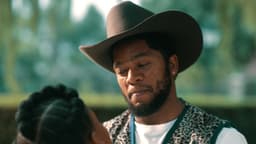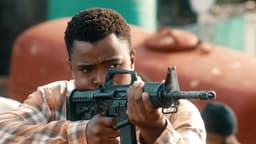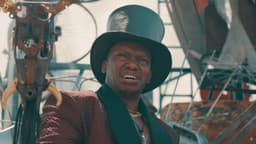
Brian Cox on his documentary Made of Money
In Made of Money With Brian Cox, the celebrated actor, who plays Logan Roy in HBO’s Succession, is swapping the role of ruthless media tycoon for documentary film-maker and travelling to the extreme frontiers of the exploding wealth gap as the cost-of-living crisis kicks in.
In this interview, he tells us how his childhood informed his world view, and why he thinks of money as "his personal demon".
Watch the trailer for Made of Money With Brian Cox
As co-creator of Made of Money, can you tell us where the idea came from?
When you play one of the richest men in the world, you live this life for nine months of the year where you're in a kind of cocoon of richness and I started to think about doing something which was the corollary of that.
Our initial idea was that money defines you, and we started to talk around that. I realised that this was something that I really wanted to talk about; I wanted to talk about the extremity of it, and the difference of it, and the range of it and the sheer agony of the fact that people don't have it. Wealth is becoming more and more concentrated in that top one per cent and the rest of the world is suffering badly. Many people do not have the means by which they can achieve any kind of standard of living for themselves. Money is the tragedy of the world.
I feel there's an inequity there that needs to be dealt with. So, this series comes very much from what I grew up with and what I saw, having been lower middle class and having a relatively happy childhood until my father passed away.
Tell us a little bit more about your childhood.
My father, I think, was greatly troubled by the fact that he was he was a great socialist. He was a pater familias in the small ghetto area of Dundee where he had a shop. I recently met a man from the area who was 80-plus who told me he remembers my dad as a very kind and very considerate man. Another person told me my dad helped her parents to get started when they were very young.
My father had this shop, this business where he gave credit to people who didn’t have the money to pay or he let them have it "on tick". People were not able to pay the debt back and they took advantage of that. But even if they were taking advantage of him, he wouldn’t see that. He would just say that there was some kind of trauma at the root of their behaviour and he would let it slide. He was very kind.
My mother was more liberal and would say, 'We have to remember charity begins at home.’ That was the sort of dilemma that I grew up with – between these extremes.
When my father tragically passed away, my mother felt the most horrendous guilt. I found this beautiful letter by her where she explains the 'little misgivings' – as she put it – that they had. There was this fissure in the family, and she felt awfully guilty that she’d been on his case a lot ... So, it was a problem for me having witnessed that, then grown up in awful poverty after my father passed away.
I say it was awful, I actually didn’t really feel it in that way. I just got on with it. I just felt like I had to survive, and my survival mechanism kicked in. I knew what I wanted to do, I knew I wanted to pursue acting and that was the journey I was on. My sisters look at me now and they say, 'You had the worst time of all', and I can understand why they say that but it didn’t feel like that. It just meant that my muscles were growing in a certain area.

One of the most moving moments of the documentary is when you go to the fish and chips shop in Dundee and ask for scraps. What is the relevance of that?
After my father passed away, my mother was very unwell and was in hospital for a long time and had electric shock treatment which destroyed part of her memory, so even after she came out of hospital she was in a very poor way, and she couldn’t work.
“Sometimes on a Thursday I would go over to the fish and chip shop and ask if they had any scraps – the bits of batter at the bottom of the pan – and I would take those home for me and my mother to eat.”
There was no medical pension, only a widow’s pension, which she got on a Friday, but it would often run out on a Thursday. My mother had a certain amount of pride. She was not happy about that situation, and she eked out the money so that didn’t happen too often, but it left an impression on me.
You also went back to your childhood home in Dundee to film. You seemed very visibly moved by that moment. Was it cathartic?
Yeah, there are memories there. I especially remember coming home from school the day my dad died, I remember that so vividly. My neighbour, Mrs Robey, being on the stairs and crying.
The Celts have essentially been nomadic, because we've always been pushed to the edge of the edge of the known world: Brittany, Cornwall, Ireland, then Scotland, and I’m part of that kind of exodus, I’m a hundred per cent Celt. So, when we talk about home, it's a sort of floating idea. It's very much, 'Home is where the heart is'. It’s the idea of finding sanctuary somewhere, and Dundee is very much part of that for me, and it’s a matriarchy.
You say in the programme that money is your 'personal demon'. Can you explain your relationship to money now?
I’ve managed for seventy-odd years to not be too plagued by it, but I still feel I have the Sword of Damocles hanging above me, a fear that it’s all going to be taken away and I’m going to end up in poverty again. Even though it didn't trouble me as a child, as I got older, I realised, 'Oh my God, Brian, you got through that, but the Sword of Damocles is still hanging over you'.
You seemed upset on camera, and even questioned whether you should be making the show at all.
You're desperately aware that you're treading on people's toes, and not just with the poorer people, but also from the richer people that we interviewed because you've been invited into their homes and you have to treat it with respect and you have to try to understand what their journey is, and how that journey has got them to where they've got.
You can question it, you can criticise it, but you've got to understand that there's a journey that takes place and a particular life. I think that this is a kind of deep human dilemma.
That's why the sixties was such an amazing time because there was a proper wealth tax; people were taxed at the right level. I came down from Scotland in the sixties to study at LAMDA and I could only do that because I had a grant from the Scottish Government that paid for my education which was done purely on my talent. It wasn't done on my scholastic record, because my scholastic record was a complete disaster.
We’ve allowed that to go horribly wrong. Now a small percentage of the world's population has got very, very, very rich indeed and the rest of the world has suffered as a result.

What do you think the solution is?
A proper wealth tax. A lot of the very richest people are very happy to pay the wealth tax. Billionaire John Caudwell, who I interviewed for the programme, said he would happily pay it. It's just governments that go, 'Well, we can tap into something else'. But if you have a proper government, they should say that everybody must pay what they can to support the state and the welfare.
We had a welfare state that was second to none, and they’ve been battering it to b*ggery for years ... In a way it's the system that the villain, it's not the individuals; the individuals merely try and work the system to the best advantage, and that's the problem. We need a proper system.
Did you find any glimmers of hope?
There were individual acts of heroism, yes. I met this guy called Peter in Dundee and it still sits with me as one of the most heroic things ever. I was at the community larder and interviewing people about how tough it was. They pay for the food rather than being given it: it’s something like £2 for a bag of canned food, or if you pay £4 you can get a bit more or £6 will include some frozen food, because it’s very important for people to maintain human dignity, and simple self-respect.
While I was there, this chap came in with a stick and I asked if he was doing this for his family and he said he was doing it for about 15 people who can’t get there because they live in high-rises and they’re older and can’t manage the journey. I said, 'That’s very humbling.' He had this label sewn onto his arm and I asked what it was, and he said, 'It’s to show I’m blind'. I was blown away. I said, 'And you still do this?' and he said, 'Well if I don’t do it, who will?'.
For me, it was one of those moments when you just feel shame. You go, 'This is an amazing human being.' It’s humbling and it's shameful but at the same time, this is the great side of who we are, what we possibly can do and possibly be. It’s incredibly laudable. This man is a hero, and it makes you feel good and although it’s shameful it also makes you feel, “Well, there's still hope when we have people like this doing what they do'. There's a lot more out there than we give them credit for.
Finally, having played Logan Roy for so many years now, is it strange to step back onto these lavish locations having made your documentary? Do you think about Logan's world with fresh eyes now?
Those feelings existed before I ever did the show. The great thing about Succession is it is a satiric critique of that world. It's very much about anti-entitlement and it shows the problem of entitlement and what entitlement does, particularly through the Roy children.
More like this

South Africa’s stories and storytellers recognised as SAFTA nominees announced
Mzansi’s boldest stories take centre stage as the 2026 SAFTA nominees are unveiled, with a wave of nominations across DStv and Showmax.

Billy Joel: And So It Goes (2025)
An honest, insightful, and deeply moving look at the life and career of acclaimed musician Billy Joel, covering both his struggles and triumphs.

Surviving Mormonism with Heather Gay S1
Former RHOSLC cast member Heather Gay investigates hidden truths within the Mormon church, exposing cracks in its perfect facade.

Brakpan Chronicles: Die mense sê, kom in
The two-part documentary series Brakpan Chronicles, by Rian van Heerden and Provoco, will premiere soon on Showmax.

Wizkid: Long Live Lagos (2025)
This intimate and uplifting documentary explores Grammy-winning Nigerian artist Wizkid's rise to superstardom as one of the biggest Afrobeats artists.

Helderberg S1
South Africa suffered its worst air disaster in 1987. The hunt for the truth about what happened to SAA Flight 295 is still on almost 40 years later.

Diddy: The Making of a Bad Boy (2025)
This sensational documentary delves into the rise and fall of Diddy, offering insight into his childhood, his meteoric rise, and his arrest.

Why Jackie Phamotse says Slay Queens is a must-watch
Jackie Phamotse opens up about her role on Slay Queens, her experiences and why the documentary should be required viewing. Stream now on Showmax.
Outlaws, now streaming on Showmax
Go on holiday with RHUGT: Africa
Showmax is the home of HBO in Africa

Jojo on The Real Housewives Ultimate Girls Trip: Africa reunion, social media backlash and more
Jojo opens up about the highly anticipated reunion for The Real Housewives Ultimate Girls Trip: Africa, coming to Showmax on 20 and 27 February.

South Africa’s stories and storytellers recognised as SAFTA nominees announced
Mzansi’s boldest stories take centre stage as the 2026 SAFTA nominees are unveiled, with a wave of nominations across DStv and Showmax.

Billy Joel: And So It Goes (2025)
An honest, insightful, and deeply moving look at the life and career of acclaimed musician Billy Joel, covering both his struggles and triumphs.

Surviving Mormonism with Heather Gay S1
Former RHOSLC cast member Heather Gay investigates hidden truths within the Mormon church, exposing cracks in its perfect facade.
Latest Stories

Schalk Bezuidenhout trades stand-up for 9-5 in Die Kantoor

A heartbreaking loss: Nolwandle Biyela’s final stand in Outlaws Season 2

Fall in love with romantic drama Touch, now on Showmax

Antonie Marx on Volspoed and why it's a must-watch

Sandra Stein makes her debut on Law, Love and Betrayal S2

Albert Pretorius on Die Kantoor, SA’s re-imagining of The Office

20+ addictive South African reality shows to stream

Where to watch The Real Housewives franchise online

How to Train Your Dragon: Bringing Hiccup and Astrid to life

What to watch on Showmax in January 2026

7 things to know about indie award-winning movie Dìdi

Mission: Impossible – The Final Reckoning’s South African stunts

Die Kwiksilwers (2024)

Where to see the cast of Mpondoland on Showmax

Angel on The Real Housewives Ultimate Girls Trip, Jojo and more

Thandolwethu Zondi on his new role in Outlaws S2
Must-watch trailer for Showmax's turbo-charged reality series Volspoed

The Real Housewives Ultimate Girls Trip cast on first impressions, beefs and more

Fana Mokoena on playing a sangoma in Masinga

Princess Jecoco on The Real Housewives Ultimate Girls Trip Africa

Tlali returns: Outlaws’ most loved and hated villain is back

Novocaine: the US box office hit shot in Cape Town

Why Jackie Phamotse says Slay Queens is a must-watch

Evodia on Ultimate Girls Trip Africa and her return to reality TV







